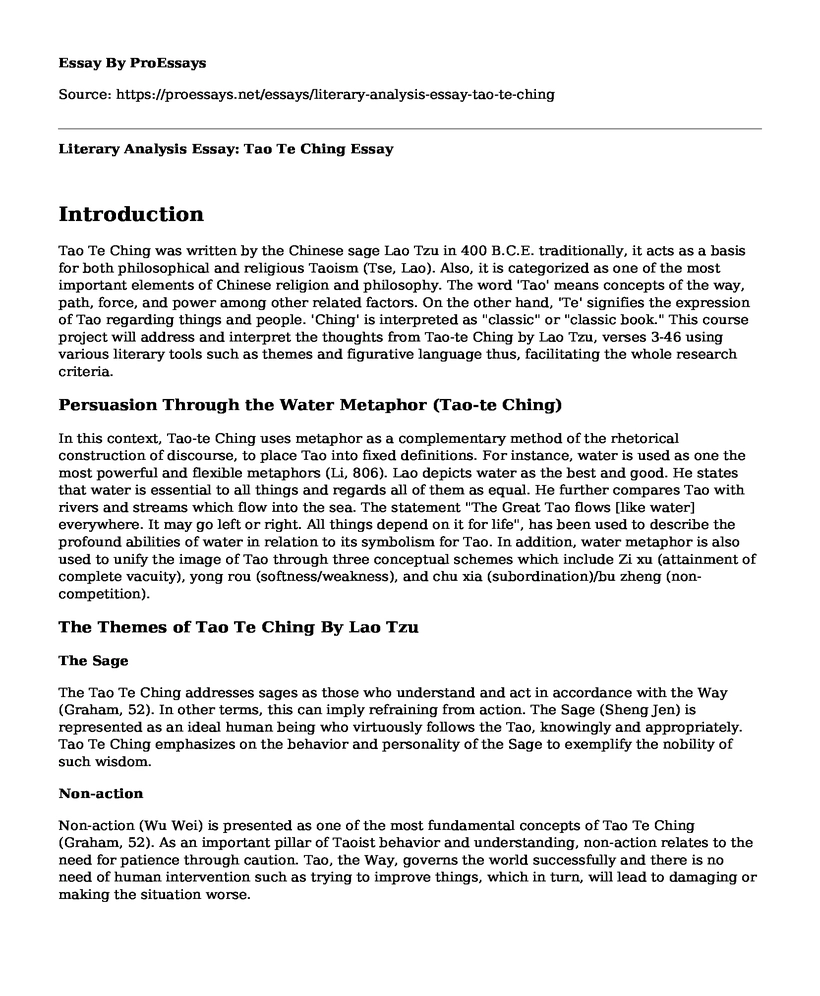Introduction
Tao Te Ching was written by the Chinese sage Lao Tzu in 400 B.C.E. traditionally, it acts as a basis for both philosophical and religious Taoism (Tse, Lao). Also, it is categorized as one of the most important elements of Chinese religion and philosophy. The word 'Tao' means concepts of the way, path, force, and power among other related factors. On the other hand, 'Te' signifies the expression of Tao regarding things and people. 'Ching' is interpreted as "classic" or "classic book." This course project will address and interpret the thoughts from Tao-te Ching by Lao Tzu, verses 3-46 using various literary tools such as themes and figurative language thus, facilitating the whole research criteria.
Persuasion Through the Water Metaphor (Tao-te Ching)
In this context, Tao-te Ching uses metaphor as a complementary method of the rhetorical construction of discourse, to place Tao into fixed definitions. For instance, water is used as one the most powerful and flexible metaphors (Li, 806). Lao depicts water as the best and good. He states that water is essential to all things and regards all of them as equal. He further compares Tao with rivers and streams which flow into the sea. The statement "The Great Tao flows [like water] everywhere. It may go left or right. All things depend on it for life", has been used to describe the profound abilities of water in relation to its symbolism for Tao. In addition, water metaphor is also used to unify the image of Tao through three conceptual schemes which include Zi xu (attainment of complete vacuity), yong rou (softness/weakness), and chu xia (subordination)/bu zheng (non-competition).
The Themes of Tao Te Ching By Lao Tzu
The Sage
The Tao Te Ching addresses sages as those who understand and act in accordance with the Way (Graham, 52). In other terms, this can imply refraining from action. The Sage (Sheng Jen) is represented as an ideal human being who virtuously follows the Tao, knowingly and appropriately. Tao Te Ching emphasizes on the behavior and personality of the Sage to exemplify the nobility of such wisdom.
Non-action
Non-action (Wu Wei) is presented as one of the most fundamental concepts of Tao Te Ching (Graham, 52). As an important pillar of Taoist behavior and understanding, non-action relates to the need for patience through caution. Tao, the Way, governs the world successfully and there is no need of human intervention such as trying to improve things, which in turn, will lead to damaging or making the situation worse.
Moderation (Jian)
In this context, Lao Tzu relates to the significance of modesty and moderation in all things. The word 'Jian' means frugality and restraint (Graham, 52). For instance, 'excess' causes straining among individuals and the society in general. Nature, as ruled by Tao, is regarded as a delicate thing which cannot be tuned either by impulsive action or exaggeration. In this suggestion, the only way to find harmony with the Way (Tao) is by having a true piece of mind.
Conclusion
Tao Te Ching was originally presented as an oral work in ancient Chinese. In most cases, it was recited out loud for the purpose of memorizing the concepts. Tao Te Ching consists of various literary analysis tools such as themes including the Sage, non-action and moderation as well as metaphors including the Water Metaphor which encompass an ideal perspective in relation to finding harmony with the Way (Tao).
Works Cited
Graham, Angus Charles. Disputers of the Tao: Philosophical argument in ancient China. Open Court, 2015.
Tse, Lao. Tao Te ching. Mauad Editora Ltda, 2011.
Li, Peter Ping, Steven Shijin Zhou, and Abby Jingzi Zhou. "The Taoist spirit of Haier: The metaphor of sea based on the symbolism of water." Management and Organization Review12.4 (2016): 803-806.
Cite this page
Literary Analysis Essay: Tao Te Ching. (2022, Sep 11). Retrieved from https://proessays.net/essays/literary-analysis-essay-tao-te-ching
If you are the original author of this essay and no longer wish to have it published on the ProEssays website, please click below to request its removal:
- Literary Analysis Essay on Paradise Lost by John Milton
- Literary Analysis Essay on Similarities Between Brain on Fire and Ten Days in a Madhouse
- Challenges to Colonialism in Shakespeare's The Tempest Essay Example
- Essay Sample on Comparing Two Distinct Authors: Maya Angelou & Harry Belafonte
- Joker: A Unique, Complex Antihero and Disruptor - Essay Sample
- Essay on Frankenstein and Blade Runner: Examining Themes of Technology and Humanity
- Essay Example on Ode on a Grecian Urn: Capturing Life in Its Fullest







